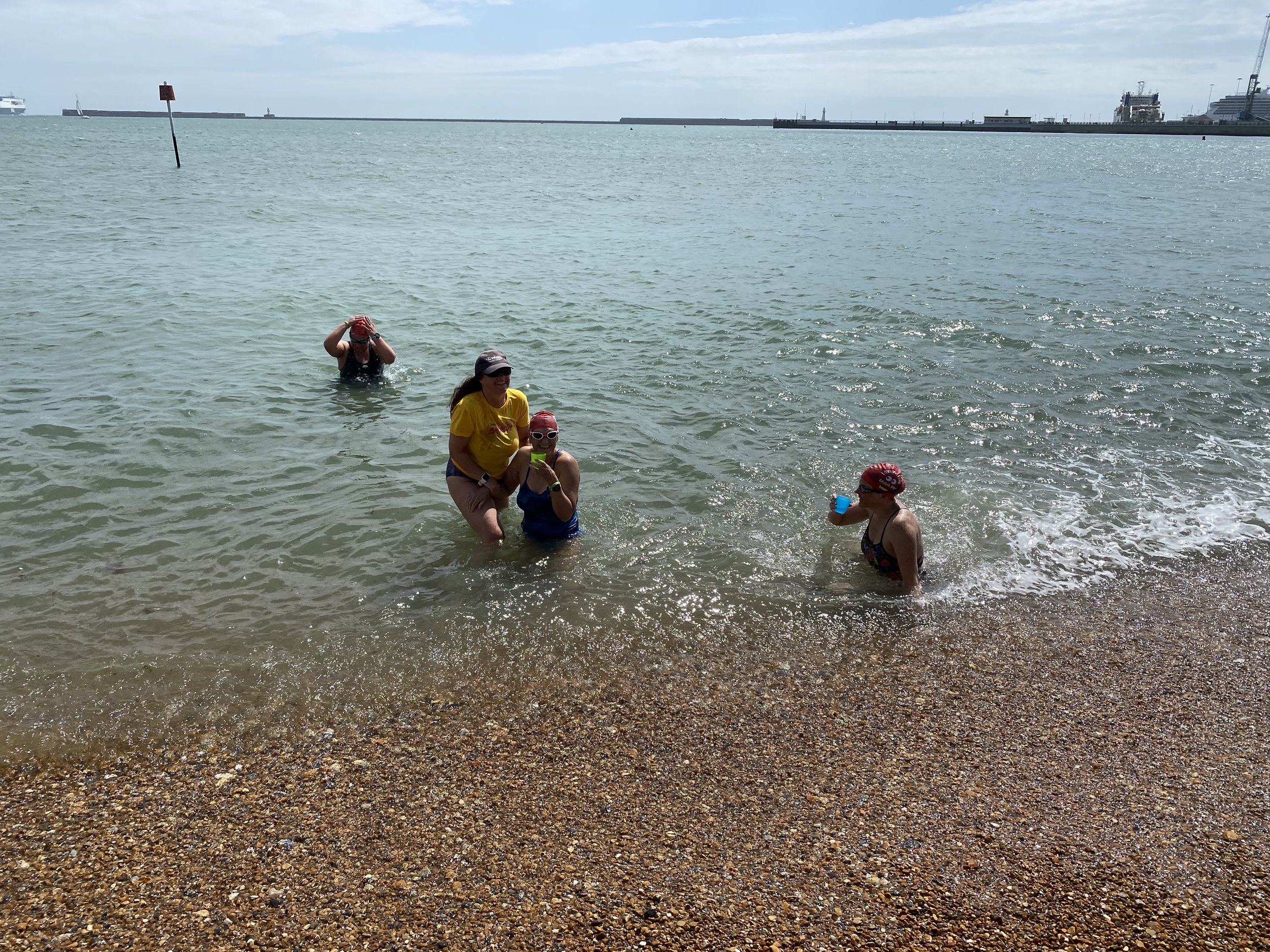Week 14 - Rail Strikes, Bob Watch and the Dovercoaster
Weekly Review
NB Please scroll to the bottom for a selection of the photos taken
Train strikes strike again!!
In recent weeks there has been some outrageous bobbing - and right in front of the beach, so this week we wore our Bay Watch outfits, except they were edited to be Bob Watch!
Saturday saw yet another train strike in the UK, impacting swimmers’ ability to get to Dover. Those who were able to get there knocked out some great swims and it was a glorious day with a gentle wash cycle at the ferry wall end.
Sunday saw normal train service resume. It also saw pretty high winds. It’s fine for training, as we can pretty much always train in the harbour. It does stop swims going across the channel though. That meant that some who would much rather being going for the big day were actually still training. Whilst practicing their best patience skills. It’s frustrating. Keep the faith, your day will come.
The high winds made for the ‘washing machine’ on spin cycle by the ferry wall. Given that we are protected in the harbour, you can imagine what was happening in the channel!
Despite the challenging conditions, particularly on Sunday, not a single person got out early. Some actually opted to do more than they originally planned. There were no dramas. There were some might impressive swims. By that I don’t just mean those who are called out below for the big swims, I mean the small personal victories, the moments when it all came together for some, for the demons that were slayed and for the team work that was demonstrated.
One thing I really must call out though is Louisa and her 360 degree seated pirouette in the waves with a cake in one hand and a drink in the other, and neither got lost to the wave - impressive! There were a few swimmer vs wave moments, some of whom were steadied by Mandi
For those that are riding the Dovercoaster - hold your nerve - your day will come.
Shout outs
Training
Congratulations to:
Geoff for your 10 hour swim
Louisa for your 8 & 5 weekend
Marion for your 6 hour swim
Jill for your 5:30 swim (and a mighty fine handstand at the end!)
Channel swimmer on the beach
Another week that saw success in multiple bodies of water, including:
Hayley Brant & Helen Smith for their epic 3 lakes in 3 days challenge. I’ll get the order wrong but the lakes were Windermere, Ullswater & Coniston. Epic!
John Royden on finishing the final part of Lake Geneva, unfinished business from last year is now finished.
Tulasi Chaitanya Mothukuri for his successful channel solo on 26th July in a time of 15hrs 18mins
Croydon Amphibians channel relay including Lucy Ashdown Parkes on 26th July in a time of 13hrs 5mins
Aspire Meercats for their channel relay on 29th July in a time of 13hrs 12mins
Anita Goyos for her Round Jersey solo on 28th July
There were also some swims that ended with unfinished business. Feel free to come and chat it through, if we can help you unpick it all, we’d be happy to help.
Hayley Brant - 3 lakes in 3 days
Debbie Collingwood - Channel Swimmer
Swim stats
Note: Water temperature taken during the swim session in the harbour. Air temperature, wind direction & wind speed taken from the Port of Dover app. Please remember that we get a lot of shelter in the harbour thanks to the walls.
Saturday:
Swimmers: 14
Water temperature: 19.7C
Air temperature: 18.4C
Conditions: F4 WSW. Flat to start. Sunny. A bit choppy by the ferry wall at high water.
Sunday:
Swimmers: 18
Water temperature: 19.8C
Air temperature: 19.1C
Conditions: F5 gusting F6. Sunny. Choppy with white horses across half the harbour at high water.
Volunteers & beach crew
Thank you to everyone who helped out this weekend - either a little or a lot. Thank you to Mandi & Rich for being ‘on rota’ and to everyone who helped out with the feeds and celebrations. We are a great team ❤️
If you want to join the fun, why not pick a date and join the fun on the beach!
DCT would like to take this opportunity to formally thank Paul James for his service over the last few seasons on the beach, in the kayak and on the leadership team. He has now moved on from working within DCT. Thank you Paul.
The adventures of Dover Dave
Dover Dave continues to live his best life. This week he spend time with Jane and Kookie Bear. What a week! There were some great lessons for us all about the tide, about the impact of too much sugar, dodgy card games and how to run a business. For a full diary, take a look at our facebook group.
Dave is off to spend the week with Hayley & Richard this week.
DCT Continues to evolve
Your DCT Support Options
In years gone by, the only support available to you was what happened at the weekend in Dover. Times change and we continue to adapt to support the swimmers of today.
I thought it was worth reminding you of the support options available to you outside of the beach:
Weekly community call (currently on a Tuesday and likely to change to a Monday from September). This is free to members and £2 per session for anyone else. The community call is an online zoom session where you can hang out and chat with others or come armed with your long list of questions.
WhatsApp pod groups those who have paid for a season of training and / or paid to be a pod member will have ready access to message others in your chosen pod. Each of the pod leaders are in the WhatsApp groups too.
Annual seminars - normally hosted over a weekend, you’ll hear about all sorts of topics from a group of experts that you just won’t find anywhere else.
Masterclasses - smaller groups who meet weekly for 6 weeks to focus in on a host of topics that will help you prepare for your big day
One to one support - if you want tailored training plan support, this may be for you. Mandi or I will meet with you fortnightly and guide you from where you are, to where you need to be for your big day. We’ll help you plan your whole training schedule using the principles of training and reacting to how you cope and any events that may mean that you need to change your approach.
That’s a lot of options! With the exception of the seminars / webinars where we have a host of experts present, the people who are able to speak on behalf of DCT are limited to:
WhatsApp groups: our pod leaders are Emma, Mandi & Dirk
Community call: generally hosted by Emma
Masterclasses: generally hosted by Emma, with some content potentially delivered by others
One to one support: Emma or Mandi
If there are other support options that you think we should have, please do ask.
Our Facebook Group does provide for peer support and also enables people to connect with people who have expressed an interest in mentoring swimmers. These are private arrangements outside of the control or influence of DCT.
Sustainability
DCT has been a continually evolving organisation since I first took over in 2016. We follow the science. We make small changes, and sometimes there are big ones. This season has been challenging for me as I juggle multiple responsibilities (including full time work) and my own Covid recovery. The same is true of Mandi. This has inevitably led us to reflect on the sustainability of our model, the services that we offer, our pricing, how we maximise safety and your success.
The world has changed a lot in the last 7 years and we too need to adapt.
The model for training will continue as it is for the remainder of this season and we will reflect on what changes are needed in advance of the 2023 season, all aimed at creating a sustainable model that maximises your chances of success and enables enjoyment for all.
That doesn’t mean that we have to wait for everything though. We routinely review our policies and processes and safety remains our top priority. Our updated Safeguarding Policy has been loaded to the website and I am delighted to announce that Vikki Chester has been appointed as our Welfare Officer. Vikki has heaps of professional experience in this area and we are lucky to have her support. The Welfare Officer is a role that we appoint on a year by year basis and Vikki has agreed to see out this season and through to next season. Read more about the welfare office role here.
Paddlefish Ponderings - Dealing with uncertainty
“Although our intellect always longs for clarity and certainty, our nature often finds uncertainty fascinating.”
At the seminars you’ll hear people talk about the challenges of the Dovercoaster - the rollercoaster of emotions that can happen if the weather gets in the way of your swim and you don’t swim when you think you will.
Training is [relatively] easy. We can plan it out, taking into account the principles of training, your work life and when your swim window is.
The challenge starts if that tide comes around and you don’t have the opportunity to get wet. What do you do next? Do you know when your next opportunity to swim will be? What about the availability of your crew? How do you now approach your training.
This can be unsettling. Everything before was broadly within your control and now suddenly you’re dealing with a great deal of uncertainty.
Life in general is the same, and so you can call on the tactics you use to deal with uncertainty for your swim too.
Life is filled with uncertainty and worries about what the future holds. While many things remain outside your control, your mindset is key to coping with difficult circumstances and confidently facing the unknown. You do have control here.
The role of uncertainty in life
As human beings, we crave security. We want to feel safe and have a sense of control over our lives and well-being. Fear and uncertainty can leave you feeling stressed, anxious, and powerless over the direction of your life. It can drain you emotionally and trap you in a downward spiral of endless “what-ifs” and worst-case scenarios about what tomorrow may bring.
We’re all different in how much uncertainty we can tolerate in life. Some people seem to enjoy taking risks and living unpredictable lives, while others find the randomness of life deeply distressing. All of us have a limit. If you feel overwhelmed by uncertainty and worry, it’s important to know that you’re not alone; whilst we may not be in the same boat, we are in the same ocean. It’s also important to realise that no matter how hopeless and helpless you feel, there are steps you can take to better deal with uncontrollable circumstances, alleviate your anxiety, and face the unknown with more confidence.
Learning to cope with uncertainty
While we may not wish to acknowledge it, uncertainty is a natural and unavoidable part of life. Not everyone faces the Dovercoaster, but some do. As the Covid pandemic demonstrated, life can change very quickly and very unpredictably. One day things may be just fine, the next you’ve suddenly become sick, lost your job, or found yourself struggling with residual health issues when you’ve always been fit & well.
To cope with all this uncertainty, many of us focus on worrying in order to predict the future and avoid nasty surprises. Worrying can make it seem like you have some control over uncertain circumstances. You may believe that it will help you find a solution to your problems or prepare you for the worst. Maybe if you just agonise over a problem long enough, just think through every possibility, or read every opinion online, you’ll find a solution and be able to control the outcome. Unfortunately, none of this works. Chronic worrying can’t give you more control over uncontrollable events; it just robs you of enjoyment in the present, saps your energy, and keeps you up at night. But there are healthier ways to cope with uncertainty—and that begins with adjusting your mindset.
The following tips can help you to:
Focus on controlling those things that are under your control.
Challenge your need for certainty.
Learn to better tolerate, even embrace, the inevitable uncertainty of life.
Reduce your anxiety and stress levels.
Tip 1: Take action over the things you can control
Much about life is uncertain at the moment—and many things remain outside of your control. But while you can’t control the wind in the English Channel, the Covid pandemic or the Ukraine conflict, you’re not totally powerless. Whatever your fears or personal circumstances, instead of worrying about the uncontrollable, try to refocus your mind on taking action over the aspects that are within your control.
For example, you still have control over making sure that your kit is ready and for understanding which of your team (swimmers or crew) are available for dates outside of your tidal window. Similarly, if you’re worried about how to adapt your training while you wait, you can still take action by talking to us on the beach, through the pod WhatsApp groups or in the community call.
By focusing on the aspects of a problem that you can control in this way, you’ll switch from ineffective worrying and ruminating into active problem-solving. Of course, all circumstances are different and you may find that in some situations all you can control is your attitude and emotional response.
Actively deal with your emotions
When circumstances are out of your control, it’s easy to become overwhelmed by fear and negative emotions. You may think that bottling up how you feel, trying to put on a brave face, or forcing yourself to be positive will provide the best outcome. But denying or suppressing your emotions will only increase stress and anxiety and make you more vulnerable to depression or burnout.
When you can do nothing else about a situation, you can still actively face up to your emotions—even the most negative and fearful ones. Allowing yourself to experience uncertainty in this way can help you reduce stress, better come to terms with your circumstances, and find a sense of peace as you deal with challenges.
Tip 2: Challenge your need for certainty
While uncertainty and change are inescapable parts of life, we often adopt behaviours to try to cope with the discomfort they can bring. In addition to worrying through every possible scenario, you may:
Excessively seek reassurance from others. You repeatedly ask friends or loved ones if you’re making the right decision, endlessly research information online, or seek out expert advice in an effort to remove uncertainty from your life.
Procrastinate. By not making decisions, you hope to avoid the uncertainty that inevitably follows. You’ll find ways to delay or postpone acting—or even avoid certain situations all together—in an attempt to prevent bad things from happening. I’ve been known to stay up late when there is something that I don’t want to face the next day. It’s as if staying up means that the event I’m dreading will never come. It does come of course and then I’m tired making me less effective at dealing with the thing I was worried about.
Repeatedly check things. You call or text your family, friends, or pilot again and again to check for updates or make sure they’re ok. You check and re-check emails, texts, or forms before sending, double-check lists to ensure you haven’t missed anything that could have repercussions on the predictability of the future.
How to challenge these behaviours
You can challenge the behaviours you’ve adopted to alleviate the discomfort of uncertainty by asking yourself the following questions:
What are the advantages of certainty? What are the disadvantages? Life can change in a moment and it is filled with unexpected events and surprises—but that’s not always a bad thing. For every unpleasant surprise, there are good things that happen out of the blue as well. Opportunity often arises from the unexpected and having to face uncertainty in life can also help you learn to adapt, overcome challenges, and increase your resilience. It can help you to grow as a person.
How much can you be absolutely certain about in life? Does anyone have a job for life, a guarantee of good health, or absolute certainty over what tomorrow will bring? Behaviours such as worrying and procrastinating offer the illusion of having some control over a situation, but what do they change in reality? The truth is no matter how much you try to plan and prepare for every possible outcome, life will find a way of surprising you. All striving for certainty really does is fuel worry and anxiety.
Do you assume bad things will happen just because an outcome is uncertain? What is the likelihood they will? When you’re faced with uncertainty, it’s easy to overestimate the likelihood of something bad happening—and underestimate your ability to cope if it does. But given that the likelihood of something bad happening is low, even in these precarious times, is it possible to live with that small chance and focus instead on the more likely outcomes? Ask other swimmers who’ve experienced the Dovercoaster how they coped with uncertainty. Could you do the same?
By challenging your need for certainty, you can begin to let go of negative behaviours, reduce stress and worry, and free up time and energy for more practical purposes.
Tip 3: Learn to accept uncertainty
No matter how much you strive to eliminate doubt and volatility from your life, the truth is you already accept a lot of uncertainty every day. Each time you cross a road, get behind the wheel of a car, or eat a takeaway or restaurant food you’re accepting a level of uncertainty. You’re trusting that the traffic will stop, that you won’t have an accident, and everything you’re eating is safe.
The chances of something bad happening in these circumstances is small, so you accept the risk and move on without requiring certainty.
When irrational fears and worries take hold, it can be hard to think logically and accurately weigh up the probability of something bad happening. To help you become more tolerant and accepting of uncertainty, the following steps can help:
Identify your uncertainty triggers. A lot of uncertainty tends to be self-generated, through excessive worrying or a pessimistic outlook, for example. However, some uncertainty can be generated by external sources, especially at times like this. Reading stories that focus on worst-case scenarios, spending time on social media, or simply communicating with anxious friends can all fuel your own fears and uncertainties. By recognising your triggers, you can take action to avoid or reduce your exposure to them.
Recognise when you feel the need for certainty. Notice when you start to feel anxious and fearful about a situation, begin to worry about what-ifs, or feel like a situation is far worse than it actually is. Look for the physical cues that you’re feeling anxious. You might notice the tension in your neck or shoulders, shortness of breath, the onset of a headache, or an empty feeling in your stomach. Take a moment to pause and recognise that you’re craving reassurance or a guarantee.
Allow yourself to feel the uncertainty. Instead of engaging in futile efforts to gain control over the uncontrollable, let yourself experience the discomfort of uncertainty. Like all emotions, if you allow yourself to feel fear and uncertainty, they will eventually pass. Focus on the present moment and your breathing and allow yourself to simply feel and observe the uncertainty you’re experiencing. Take some slow, deep breaths or try a meditation to keep yourself anchored in the present.
Let go. Respond to the what-ifs running through your head by acknowledging that you’re not a fortune teller; you don’t know what will happen. All you can do is let go and accept the uncertainty as part of life.
Shift your attention. Focus on solvable worries, taking action on those aspects of a problem that you can control, or simply go back to what you were doing. When your mind wanders back to worrying or the feelings of uncertainty return, refocus your mind on the present moment and your own breathing.
Accepting uncertainty doesn’t mean not having a plan
Accepting uncertainty doesn’t mean you shouldn’t have a plan for some unforeseen circumstances. It’s always good to have a view on who might crew if your swim is in a different tide window, on how you’re going to get time off work at short notice, or what you will tell those who are following your journey. But you can’t prepare for every possible scenario. Life is simply too random and unpredictable.
Tip 4: Focus on the present
Uncertainty is often centred on worries about the future and all the bad things you can anticipate happening. It can leave you feeling hopeless and depressed about the days ahead, exaggerate the scope of the problems you face, and even paralyse you from taking action to overcome a problem.
One of the surest ways to avoid worrying about the future is to focus on the present. Instead of trying to predict what might happen, switch your attention to what’s happening right now. By being fully connected to the present, you can interrupt the negative assumptions and catastrophic predictions running through your mind.
You can learn to purposely focus your attention on the present through mindfulness. With regular practice, mindfulness can help change your preoccupation with future worries to a stronger appreciation of the present moment—as well as help calm your mind, ease stress, and boost your overall mood.
Using mindfulness to stay focused on the present can take perseverance. Initially, you may find that your focus keeps wandering back to your future fears and worries—but keep at it. Each time you focus your attention back on the present, you’re strengthening a new mental habit that can help you break free of uncertainty.
Tip 5: Manage stress and anxiety
Taking steps to reduce your overall stress and anxiety levels can help you interrupt the downward spiral of negative thoughts, find inner calm, and better cope with the uncertainty in your life.
Make time for relaxation. Choose a relaxation technique such as meditation, yoga, or deep breathing exercises and try to set aside time each day for regular practice.
Get plenty of sleep. Excessive worry and uncertainty can disturb your sleep—just as a lack of quality sleep can fuel anxiety and stress. Improving your daytime habits and taking time to relax and unwind before bed can help you to sleep better at night.
Eat a healthy diet. Eating healthy meals can help maintain your energy levels and prevent mood swings. Avoid sugary and processed foods and try to add more omega-3 fats to give your overall mood a boost.
Reminders
Bookings can be made up to 48 hours ahead and be cancelled or rescheduled up to 48 hours ahead also. The system doesn’t arrange automatic refunds, so if you would like a refund, please check out our refund policy and get in touch if you would like a refund.
If you miss this deadline then I’ll book you in if I have the available time and I have your disclaimer. There is an admin fee if you don’t use the self-service option.
Arrive on time
Wear the right colour hat - red for soloists, yellow for relay swimmers
Attend the mandatory safety briefing
Those of you who are members, please remember to cancel your membership when you no longer want it. You can do that within a membership period and still have all the benefits of it, this will prevent it from auto renewing next year. You can do this within your account, by following the link in the confirmation email when you took out your membership, or by asking me to do it for you.
Looking ahead
On Tour
We found out this weekend that the town regatta is next Saturday. That’s a challenge for us as there is likely to be all sorts going on in the swim zone and all parking along marine parade will be suspended. So we are swapping our ‘On Tour’ date to next Saturday 6th August instead of 20th August.
On Tour dates:
Saturday 6th August
Saturday 17th September
The location will be either Ramsgate or Hythe and the location will be decided on the Thursday before the swim.
End of season celebration
It’s become a bit of a tradition that, rather than fade away as the season progresses that we get together for an end of season celebration on the last weekend of training. So mark the date in your calendar - Saturday 24th September - bring a picnic. We’ll bring inflatables!!
We now have a theme - Grease! Make of that what you will - I’m looking forward to some fun & creative outfits.
Spotlight in the shop
Although red & yellow hats are the ones that you need for training in Dover, we have a big range of hats, each with their unique motivational quote on one side. Which one speaks to you?
Photos
A few photos from the weekend….
If you’d consider leaving a review of your training experience, it would help those who are deciding on where to do their training for future years. Nothing means more than the voice of someone who’s used the service.



















































































